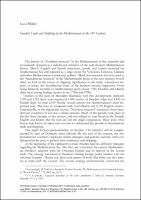Chapter Swedish Trade and Shipping in the Mediterranean in the 18th Century
| dc.contributor.author | Müller, Leos | |
| dc.date.accessioned | 2022-06-01T12:11:13Z | |
| dc.date.available | 2022-06-01T12:11:13Z | |
| dc.date.issued | 2019 | |
| dc.identifier | ONIX_20220601_9788864538570_201 | |
| dc.identifier.issn | 2704-5668 | |
| dc.identifier.uri | https://library.oapen.org/handle/20.500.12657/56018 | |
| dc.description.abstract | This paper analyses the rise of Swedish trade and shipping in the Mediterranean in the eighteenth century. It focuses on three factors that shaped Sweden’s role in the area: foreign policy interest, foreign trade policy (mercantilism), and commodity demand and supply. The foreign policy interest is represented by attempts to build an alliance with the Ottoman Empire against Russia. An outcome of this was the short-lived Swedish Levant Company. The second factor relates to Sweden’s mercantilist policy in the Mediterranean, embodied in the Swedish Navigation Act, trade and peace treaties with the North-African states, and the consular services in southern Europe. Sea salt was in the core of this policy—a strategic commodity in northern Europe. Southern Europe, too, was important market for Swedish exports goods: iron, tar and pitch, and planks. | |
| dc.language | English | |
| dc.relation.ispartofseries | Atti delle «Settimane di Studi» e altri Convegni | |
| dc.subject.other | economic history | |
| dc.subject.other | sweden | |
| dc.subject.other | international trade | |
| dc.subject.other | commercial networks | |
| dc.subject.other | 18th century | |
| dc.title | Chapter Swedish Trade and Shipping in the Mediterranean in the 18th Century | |
| dc.type | chapter | |
| oapen.identifier.doi | 10.36253/978-88-6453-857-0.23 | |
| oapen.relation.isPublishedBy | bf65d21a-78e5-4ba2-983a-dbfa90962870 | |
| oapen.relation.isbn | 9788864538570 | |
| oapen.series.number | 50 | |
| oapen.pages | 17 | |
| oapen.place.publication | Florence |

